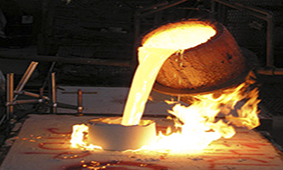
The crisis has reached the center of the foundry industry - Schumacher demands relief for the industry

The corona crisis has had Europe in its grip since the end of February 2020, and is entering its second month in Germany. How is the German foundry industry affected?
Thomas Fritsch (Foundry-Planet) conducted an interview with Max Schumacher, the managing director of the Federation of the German Foundry Industry (BDG), on the current status during the corona pandemic:
FP: You have recently asked your members again about the effects of the corona pandemic. How have the answers changed?
Max Schumacher (MS): First of all, I would like to note that we are supporting the measures to combat the pandemic, because health safety makes this necessary, even if our foundries are now very much affected by the corona crisis. We have many tips from personal conversations from the two member surveys. We have just evaluated the second one. Here are some very clear statements: We asked if the companies felt any effects in the course of operations.
Three weeks ago, 76 percent of those questioned said yes, now it is 96 percent. In other words, the crisis has now struck the center of our foundry industry. The uncoordinated closing of many production sites is an enormous challenge for the suppliers, bringing with it many problems, which we also communicated to the OEMs.
FP: What exactly are the impairments in the German foundry industry?
MS: We currently have a lot of impairments in our industry.
The restrictions on business travel are obvious. Customers stay away and no longer come to the companies, but we also have sales difficulties and supplier failures. Employees drop out, sometimes the production has to be closed, not only because of the situation with the OEM. The survey shows that around 70% of foundries are currently closed, and we see increasing liquidity shortages. This is the most pressing problem to be solved.
FP: What do the impairments mean for companies?
MS: A very significant increase in lay-offs. In our first survey, the proportion of foundries that were already working shortened hours/experiencing lay-offs or expecting to do so was around half of all companies. The situation has now worsened significantly in the past three weeks. Now, almost 90 percent of all companies have lay-offs.
FP: How do you assess the measures taken by the Federal Government to cushion the corona crisis?
MS: You really have to say that this crisis is highly dynamic and can positively state that the Federal Government is also very aware of this fact and the extraordinary circumstances. The Federal Government took the right measures very quickly, making it clear how serious it is. That is an important signal. It is crucial that politicians offer all government aid in a non-bureaucratic manner and as timely as possible. The correction of liability risks also fits in well: The 100 percent risk assumption by KfW when granting loans by the house banks is, according to our member companies, a very central cornerstone of aid for the industry. It remains to be seen whether this measure, which is limited to medium-sized companies with up to 250 employees and guarantees a repayable loan, is the last measure. The economic crisis triggered by the pandemic will not be over in a few weeks, but will be with us for much longer.
FP: What could foundries do now to be well prepared for the time after Corona?
MS: It is still too early to give an outlook. We see some very positive points in our current survey.
An example: We asked our foundries whether they were able to quickly find alternatives in the event of delivery bottlenecks. In our second survey, many more companies affirmed that than three weeks ago. That means: Our entrepreneurs are taking action, questioning their own supply chains, thinking out-of-the-box. It is about changing suppliers, also about alternatives in production. This is an extraordinary crisis situation that demands flexibility from everyone involved and a certain passion to tackle the issues, which incidentally also affects us as an association. At the moment, it is very important to get reliable commitments for delivery schedules from the customers, and we hope that the conditions are adapted to the significantly changed circumstances.
FP: What are you doing for the industry in this crisis?
MS: A central message of our mission statement is: We create space for casting. And we are doing this very actively at the moment. We guide the companies, we are with them. In a crisis like this, as a company, I want to know: where are the others? Are they facing the same problems? What can we do? In order to provide concrete answers, we have researched and compiled up-to-date information packages on the company-relevant subject areas, we call them "emergency kits". We remain close to the companies, not least through the surveys.
No special mention needs to be made of the fact that we, as representatives of interests, bring the positions of the foundries into the political discussion.
FP: Finally, if you dare to take another look: what comes after the crisis?
MS: Let's talk again in a few months' time when the acute crisis is over, when not everything is in question. Then some things will be clearer and the questions can be formulated more clearly:
Keywords supply chains, possibly relocations, are national and regional companies at least considered as valuable second sources? These discussions have begun and we as an association will monitor this closely and make our contribution. This also applies to issues that may come back on the agenda in the coming months, because avoiding burdens is not enough - real relief is also required.
Whether this is done by deleting the EEG surcharge or otherwise, is certainly an intensive issue and is being discussed with great responsibility on all sides. A moratorium on burdens and options for relief must be carefully examined and discussed. And right now we also need a scenario of how the ramp-up of public life is to be designed in the very near future. This is the only way we can build a new horizon for ourselves and our employees and reflect on the old strength of the foundry industry: innovative strength and adaptability.



Trump weighs using $2 billion in CHIPS Act funding for critical minerals

Codelco cuts 2025 copper forecast after El Teniente mine collapse

Electra converts debt, launches $30M raise to jumpstart stalled cobalt refinery

Barrick’s Reko Diq in line for $410M ADB backing

Abcourt readies Sleeping Giant mill to pour first gold since 2014

Nevada army depot to serve as base for first US strategic minerals stockpile

SQM boosts lithium supply plans as prices flick higher

Viridis unveils 200Mt initial reserve for Brazil rare earth project

Tailings could meet much of US critical mineral demand – study

Kyrgyzstan kicks off underground gold mining at Kumtor

Kyrgyzstan kicks off underground gold mining at Kumtor

KoBold Metals granted lithium exploration rights in Congo

Freeport Indonesia to wrap up Gresik plant repairs by early September

Energy Fuels soars on Vulcan Elements partnership

Northern Dynasty sticks to proposal in battle to lift Pebble mine veto

Giustra-backed mining firm teams up with informal miners in Colombia

Critical Metals signs agreement to supply rare earth to US government-funded facility

China extends rare earth controls to imported material

Galan Lithium proceeds with $13M financing for Argentina project

Kyrgyzstan kicks off underground gold mining at Kumtor

Freeport Indonesia to wrap up Gresik plant repairs by early September

Energy Fuels soars on Vulcan Elements partnership

Northern Dynasty sticks to proposal in battle to lift Pebble mine veto

Giustra-backed mining firm teams up with informal miners in Colombia

Critical Metals signs agreement to supply rare earth to US government-funded facility

China extends rare earth controls to imported material

Galan Lithium proceeds with $13M financing for Argentina project

Silver price touches $39 as market weighs rate cut outlook

















